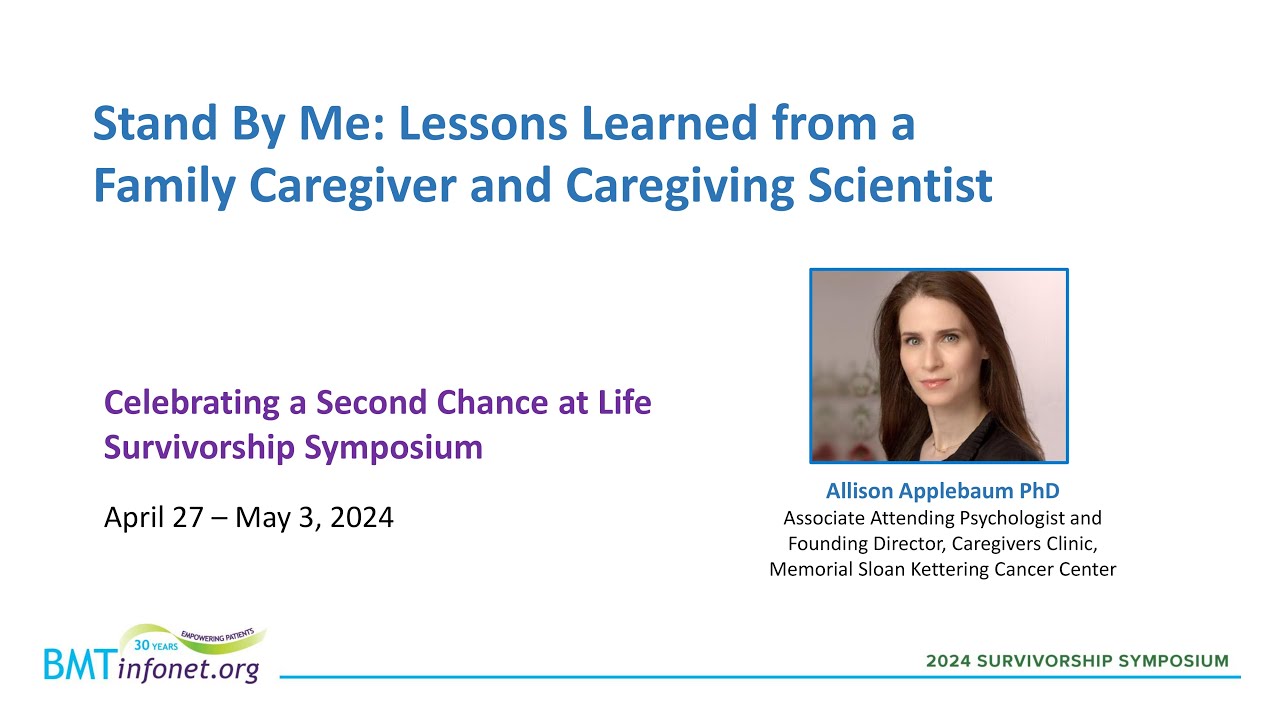Why You Need a 24/7 Caregiver
A stem cell transplant is not a procedure patients can navigate alone. In order to move forward with transplant, most centers require that patients identify someone to serve as a full-time caregiver, particularly during the recovery period.
Typically, a close family member serves as the caregiver. For some, it may be necessary to reach out to extended family members or friends for help. Some patients assemble a team of caregivers or hire temporary help.
Why You Need a Full-Time Family Caregiver
While you undergo treatment, you will be too ill and weak to manage your medical and household affairs on your own for several weeks or months. A full-time family caregiver is needed to ensure that you promptly get the medical attention you need and that your household is a safe environment.
While you are in the hospital, your caregiver will be responsible for:
- telling the medical team about any changes in your condition
- providing you with emotional support
- advocating for your needs and helping with decision-making
- communicating with family and friends
After you're discharged from the hospital, your caregiver will assume additional responsibilities including:
- transporting you to the outpatient clinic daily or weekly
- keeping track of your medical appointments
- making sure you take your many medications according to schedule
- taking care of dressings and your central venous catheter
- reporting changes in your condition to the medical team
- protecting you from sources of infection, such as visitors with colds or those who have been around sick people
- preparing nutritious meals for you
- helping you move around safely
- cleaning and cooking according to the guidelines provided by your transplant team
- in some cases, providing you with intravenous medications
These caregiver tasks may continue for several weeks or months after transplant.
Being a Caregiver is a Stressful Job
Close family members often view caregiving as a normal part of their relationship with the patient, and don’t identify themselves as ‘caregivers’. But it is important to recognize that doing all caregiving tasks is like adding a part-time, or even a full-time job to your everyday life.
Unlike a professional caregiver who goes home at night to recharge before coming back to work the next day, family caregivers are ‘on the clock’ 24/7. Thus, they can experience a lot of physical and emotional stress. Research has shown that caregiver distress is often as high, and sometimes higher, than that of patients.
Gather a Team of Helpers
It truly takes a village to get through transplant and recovery. Given the sheer number of caregiving tasks and the length of time caregivers will be relied upon, involving a team of helpers will make it easier in the long run.
Friends and family are often eager to help but aren’t sure what to do. Most people are unfamiliar with stem cell transplantation and don’t understand that support may be needed for weeks or months after transplant.
It can be hard to ask for help, but remember it makes others feel good to be able to do something. Help them help you by being specific about what you need. Make a list of all the activities that could be done by someone else and then provide that list to family and friends to see who can do what, such as:
- picking up prescriptions
- grocery shopping
- preparing meals
- providing transportation
- sitting with your loved one while you run errands or take care of your own health and well-being
- mowing the lawn or shoveling snow
- picking your children up from school or transporting them to activities
- taking care of pets
- providing financial help
Organizing help can take time and energy, so consider letting a friend or family member do this for you. Try to build ongoing support so that you don’t have to keep asking for help. For example, have a neighbor mow your lawn routinely until you feel ready to take back that task.
There are many online programs to help organize assistance such as LotsaHelpingHands, MealTrain, and CaringBridge.
Relaying Information to Others
One task many caregivers find draining is keeping family and friends informed about the patient’s progress. Consider delegating this task to one of your helpers and using technology to make it easier.
Consider setting up a communication network in advance with family, friends, neighbors, and co-workers. CaringBridge is a free website specifically designed for folks dealing with illness. You can post updates about the patient’s progress, instead of responding to individual calls, and friends and family can post messages and well-wishes for the patient.
You can also send group emails or text messages, create a blog, or share updates on Facebook.
Take Care of Your Physical and Emotional Well-Being
 To provide the best possible care for the patient, you also need to take care of your own physical and emotional well-being as well. Taking care of your health is easy to say, but it isn’t easy to do.
To provide the best possible care for the patient, you also need to take care of your own physical and emotional well-being as well. Taking care of your health is easy to say, but it isn’t easy to do.
Often, the caregiver’s needs tend to go to the bottom of the ‘to-do’ pile. But even small things can make a difference. Set aside some time each day to do something you find enjoyable. Even a few minutes to relax can help.
You will likely experience a whole host of thoughts and feelings—fatigue, worry, sadness, frustration. You may be reluctant to share those feelings with the patient for fear of burdening them. Getting emotional support is really important as those feelings can build up and stress both the mind and body.
Some caregivers find talking with a close friend or family helpful. Others find it most helpful to talk with others who have been through transplant themselves and therefore ‘get it.’ BMT InfoNet’s Caring Connections Program can connect you with another caregiver with whom you can share your questions and experiences.
Ask if mental health services are available to you through the transplant center. BMT InfoNet's Directory of Mental Health Providers can help you find a therapist who understands transplant and can help you manage your emotional well-being.
Flexibility and Patience are Essential
As with many things in life, each transplant evolves in its own way. There is no way to predict exactly what will happen.
You will need to be prepared for ups and downs during treatment and recovery. Complications can occur, and recovery sometimes takes longer than expected.
Plan all you can, but expect the unexpected. Plan to be more tired than you can imagine. Take things one day at a time or, if necessary, one hour at a time, and hang in there.
Give Yourself Credit
You, the caregiver, are a vital member of the healthcare team that is working to help your loved one recover. Acknowledge the hard work you are doing and take pride in mastering the many tasks you may have once thought you’d be unable to do.
Sometimes, despite your best efforts, problems can arise, or things don’t go as planned. It can be easy to question yourself and wonder if something you did contributed to the problems.
Resist the urge to blame yourself. You are doing your best, and not everything is within your power to control. Try to show yourself the same compassion as you would for a friend.



